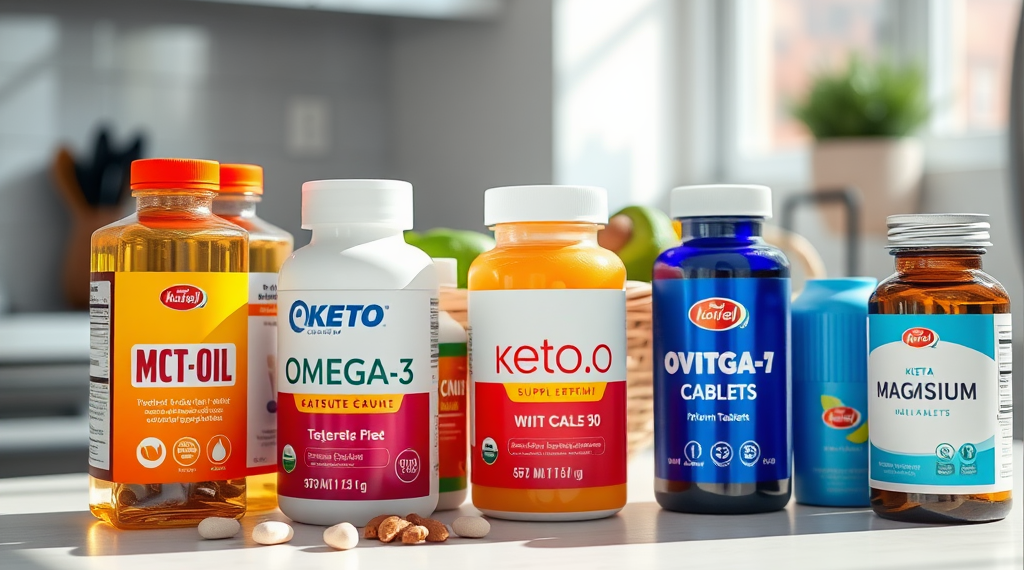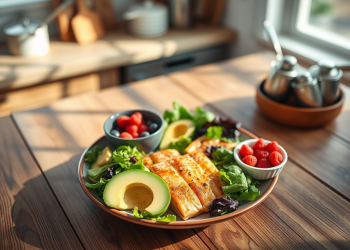Did you know that starting a keto diet can feel a little like diving headfirst into a vat of bacon and avocados with zero regrets?
But here’s the plot twist: while your taste buds are throwing a party, your body might be silently raising its hand to request a few missing nutrients. Yep, keto bliss can come with some sneaky nutrient deficiencies, which is why adding the right keto supplements to your routine is like giving your body the survival kit it didn’t know it needed.
Hold up, though—don’t panic. You’re not about to start choking down a hundred pills a day. Instead, we’re talking essentials here. Things that make your ketogenic lifestyle smoother, like butter over your morning coffee (literally). Ever heard of electrolytes? They’re like your body’s backstage crew, keeping everything running without drama. And don’t even get me started on rockstars like MCT oil or omega-3 fatty acids—think of them as VIP passes to the land of steady energy and mental clarity.
But wait, quick question: what’s your favorite keto hack so far? (Asking because my personal favorite is convincing myself that cheese is basically a food group.) ANYWAY. By the time we’re done here, you’ll know exactly which keto-friendly vitamins and supplements need to hitch a ride on your low-carb journey. Trust me, your muscles, mind, and immune system will send you literal thank-you notes. Ready? Let’s dive in.
Understanding the Need for Supplements on a Keto Diet
Switching to a ketogenic diet can feel a bit like stepping into the Upside Down (but with less Demogorgons and more dietary confusion). You’re cutting carbs, burning fat, and staring longingly at bread like it’s a long-lost lover. But here’s the thing: carbs don’t just provide energy—they also carry nutrients that your body is used to getting. When you slash those carbs, you risk saying goodbye to essentials like potassium, magnesium, and fiber—all of which are critical for keeping your body running like a well-oiled keto machine.
Signs you might be running on a nutrient deficit? Think fatigue that makes 3 PM feel like bedtime 😴, muscle cramps that turn your morning stretch into a horror movie scream, or the dreaded “keto flu”—a flu that no amount of chicken soup will cure. This is where keto-friendly supplements come in, swooping in like the superheroes of your low-carb life.
For a deeper dive into preventing common keto struggles, check out this guide to avoiding common keto mistakes.
Let’s be real: sticking to keto can be a rollercoaster ride. That’s why supplements can give you the stability you need. They fill the gaps where your diet might leave you hanging, helping to address potential pitfalls like electrolyte imbalances and nutrient deficiencies. Taking care of your body now means fewer cravings and better energy levels later, making it much easier to focus on your Netflix queue instead of whether you’re about to pass out.
Also, it’s worth clarifying: supplements don’t mean giving up whole foods. Instead, they complement your healthy fats, proteins, and (very low) carbs as you strategize how to meet your nutritional needs like a keto ninja.
Wondering where to start? Understanding the relationship between your ketogenic lifestyle and supplements is key. From electrolyte balance to vitamins and oils, there’s a pathway to keeping your health in check without breaking your carb budget.
The Role of Electrolytes in a Ketogenic Lifestyle
Oh, electrolytes. They’re the underappreciated MVPs of the keto world. If carbs were your former BFF, think of electrolytes as the childhood friend you forgot about but desperately need now that adulthood (and keto) has hit. When you switch to low-carb eating, your insulin levels dip, encouraging your body to release stored water—taking valuable electrolytes with it. This is why you might suddenly feel like a sad, dehydrated raisin 🥴.
First up: sodium. Not the villain it’s often made out to be, especially on keto. Sodium keeps your nervous system firing properly and your muscles working. Low sodium? Hello, muscle fatigue and low energy. An easy fix? Add some broth, or *gulp* that juice from pickles without judgment.
Potassium is another electrolyte you can’t ignore. It’s essential for keeping your heartbeat steady and your workouts less like an out-of-breath stumble. Leafy greens (like spinach and kale) or a supplement can help you stay on top of it. Finally, there’s magnesium—a.k.a. the chill pill of minerals—crucial for relaxation and keeping cramps at bay.
Here’s a quick electrolyte game plan:
- Embrace broth-based soups for sodium goodness.
- Make avocados your BFF to boost potassium 👑.
- Use magnesium-rich foods like almonds, or introduce a keto-friendly magnesium pill into your routine.
Top Vitamins for Keto Dieters
Vitamins often get sidelined in keto conversations, but they’re kind of a big deal. Think of them as the backstage crew making sure your body’s main show isn’t a disaster. And while keto does encourage nutrient-dense foods like leafy greens and fatty fish, some gaps are almost inevitable—hello, vitamins D and B12.
Vitamin D, often called the “sunshine vitamin,” is the keeper of strong bones and a happy immune system. But unless you’re sunbathing daily (and let’s be honest, who is?), a supplement might be necessary. Eggs and fatty fish like salmon can help, but they’re still on the lighter side of the vitamin D spectrum.
Let’s talk B vitamins. These little dynamos keep your energy levels soaring and your brain firing on all cylinders. Unfortunately, they’re often found in grains—the very thing you’ve sworn off forever on keto. If you notice energy dips or brain fog that won’t quit, consider foods like spinach or keto supplements that offer a B-complex punch. To ensure you’re getting the most from your diet, you can check out these high-fat diet tips for better meal planning.
Need a quick vitamin-savvy checklist?
- For vitamin D, give cod liver oil or fortified keto foods a shot.
- Pep up your B vitamin game with a B-complex supplement or greens like spinach 🌱.
- Keep an eye on other vitamins like C and E, as they’re equally important for overall health during ketosis.
Importance of Omega-3 Fatty Acids
Omega-3s are all the rage, but it’s not just hype. These healthy fats pack a punch when it comes to brain support, inflammation reduction, and even keeping your heart ticking happily. On a ketogenic diet, where fats are king, ensuring a balance of omega-3s with omega-6s is critical. Without balance, your diet can skew inflammatory—and no one wants internal drama.
How do you get omega-3s? Fatty fish like salmon and sardines are your go-to, but let’s face it: who’s eating sardines daily? That’s where fish oil supplements come in to fill the gap. But not all fish oils are created equal. Look for options verified for purity to avoid any surprises (hint: toxins). If you’re curious about more fat sources and how to balance them, explore this guide to keto-friendly dairy options.
Another lesser-known benefit? Omega-3s support better mood regulation. Your transition into ketopia might not feel so rocky if your brain is operating smoothly. Pair this with improved joint health, and it feels like omega-3s are the fairy godmother of keto living 💫.
For practical options:
- Opt for sustainable fish choices or fish oil supplements high in EPA and DHA.
- Incorporate flaxseeds and chia seeds into your meals for a plant-based twist 🌿.
MCT Oil: A Powerful Keto Supplement
MCT oil deserves its own place on a keto shrine, and for good reason. It’s extracted from fats like coconut oil or palm oil but streamlined to include ONLY the good stuff—medium-chain triglycerides. Why does this matter? MCTs skip the usual digestive process and go straight to becoming energy, making them the Formula 1 cars of the fat world 🏎️.
For keto dieters, this means quicker entry into ketosis, heightened energy, and a metabolism that feels like it’s wearing a cape. Plus, MCT oil provides mental clarity that’s perfect for anyone resisting the carb-induced brain fog they’re so used to. For more on managing keto brain fog and energy dips, read this guide on sustaining energy on keto.
If you’re wondering how to incorporate it, MCT oil is endlessly versatile. Stir it into a keto coffee (classic bulletproof style), blend it into smoothies, or drizzle it over salads. Just remember to ease into it—too much too fast might send your gut on a joyride you’d rather avoid 🚀.
The perks of adding MCT oil to your diet?
- Provides long-lasting energy—bye, afternoon slumps.
- Boosts your focus and mental clarity, especially during fasting periods.
- Pairs excellently with a low-carb approach to promote fat-burning while keeping calories in check.
Benefits of Digestive Enzymes on Keto
Let’s dive into the nitty-gritty of digestive enzymes. If your stomach sometimes feels like it’s trying to digest a bowling ball after your keto meals, you’re not alone. High-fat diets can strain your digestive system, especially if your pre-keto self was living on pizza crusts and instant noodles. Digestive enzymes are like the guest chefs of your digestive tract, showing up to help break down all those fats into energy your body can actually use. 🍳
Key enzymes like lipase (which breaks down fats) and protease (which tackles proteins) can become your best allies on this high-fat journey. These enzymes enhance nutrient absorption while curbing unpleasant side effects—think bloating, gas, and that too-full feeling post-meal. To keep your gut happy and digestion smooth, check out this guide on gut health and keto.
On top of that, digestive enzymes also support gut health, which often takes a backseat when your fiber intake isn’t where it used to be (looking at you, breadsticks 🥖). Pro tip: Enzymes combined with probiotics can be a powerhouse duo for balancing your gut microbiome.
Here’s how to integrate digestive enzymes into your ketogenic eating habits:
- Take a high-quality enzyme supplement with meals, especially if they’re heavy on bacon and cream-based sauces. 🥓
- Incorporate natural sources, like pineapple (bromelain) or papaya (papain), for a nutrient boost (though, watch your carb count!).
- Track results, as some people might need more support depending on gut sensitivity or prior dietary habits.
Magnesium: A Crucial Mineral During Ketosis
Ah, magnesium—often overlooked but absolutely critical when you’re living that keto life. Think of magnesium as the chill parent of minerals, swooping in to calm your muscles, ease stress, and keep everything running smoothly. Without enough magnesium, you’re not just battling cramps (those middle-of-the-night charley horses are brutal 😬) but also risking energy dips and irritability. Not ideal when you’re already saying no to cupcakes at work.
Magnesium is especially vital on a ketogenic diet because your body sheds electrolytes faster when carbs are cut. Foods like almonds, spinach, and pumpkin seeds can help, but even the most dedicated keto eater can struggle to get enough magnesium through food alone. If you’re battling with electrolyte balance, this guide to zero-carb foods can offer additional ideas.
Top magnesium options for keto dieters include:
- Magnesium citrate: Best for digestion and combating constipation (a side effect some keto newbies face).
- Magnesium glycinate: A soothing option for those struggling with sleep or anxiety, as it’s easier on digestion.
- Topical magnesium: Perfect for targeted muscle relaxation after killer gym sessions.
Not convinced? Poor magnesium levels can also affect your heart health and blood sugar balance, both of which are crucial while adapting to ketosis.
Potassium’s Role in Keto Health
If electrolytes were a reality show, potassium would be the unsung hero doing all the behind-the-scenes work. While magnesium and sodium often steal the spotlight, potassium is quietly keeping your muscles from shaking like a jittery Chihuahua. It’s crucial for nerve function, hydration, and—you guessed it—heart health. And when you’re on keto, potassium is one of the first things to jump ship as your body loses water weight in its early carb-cutting phase.
Low potassium levels can leave you feeling like a human battery running at 10%—think fatigue, weak muscles, and even heart rhythm problems. Not cute. Luckily, getting more potassium while staying keto-friendly isn’t too hard. Consider foods like spinach, avocado (yes, again!), and salmon to bolster your levels. Or, if food sources aren’t cutting it, a potassium supplement might be your best bet. For more details on avoiding these common pitfalls, check out this guide on common keto mistakes.
Why potassium matters even more for keto health:
- It maintains fluid balance, reducing bloating and cramping.
- It supports optimal muscle contractions during workouts—no more mid-squat failures. 🏋️
- Helps offset sodium intake, ensuring electrolyte harmony even on salty days.
Antioxidants: How They Support Keto
You know those memes about adulting being a mix of caffeine and sheer willpower? Swap “caffeine” for “antioxidants,” and you’ve got a pretty good depiction of how your body manages stress on keto. When shifting into ketosis, oxidative stress can increase due to changes in how your body processes fats. Enter antioxidants—the guardians of your cells, stepping in to fight free radicals like digital knights or Marvel superheroes. 🦸
Vitamins C and E are especially crucial here. Vitamin C boosts your immune system and keeps your skin glowing, while vitamin E works behind the scenes to protect cells from oxidative damage. On keto, antioxidant foods like berries, green tea, and dark leafy greens are absolute gold…but with carbs challenging your portions, supplements can ensure you’re covered.
To enhance the antioxidant game in your keto journey:
- Reach for nutrient-rich supplements packed with Vitamin C or E.
- Consider products with alpha-lipoic acid (ALA) or CoQ10 for additional antioxidant support during ketosis.
- Eat color: The darker or more vibrant the veggie, the more antioxidant-rich it usually is.
Still debating whether antioxidants are worth it? Read more about their benefits in this guide on unlocking ketosis benefits.
Maintaining Gut Health on a Keto Diet
Let’s talk about your gut—literally the center of it all. On a keto diet, the shift to low-carb eating can wreak havoc on your digestive system, leading to constipation, bloating, or unpredictable stomach woes. This is partly because many high-fiber foods (like grains and legumes) are now off the menu.
Enter probiotics and prebiotics, your gut’s new best friends. Probiotics are the good bacteria, aiding digestion and bolstering your immune system, while prebiotics are the fiber-like food that probiotics chow down on. Together, they help create a thriving gut microbiome even when fiber supplies are limited.
What should you add to your gut-health toolkit?
- Look for probiotic-rich keto options like Greek yogurt, kimchi, or sauerkraut.
- Integrate prebiotic fibers like chicory root or flaxseeds (keep portions carb-conscious).
- Consider a daily probiotic supplement tailored to keto dieters for maximum support. 🦠
A sturdy gut equals better nutrient absorption—which also means your keto supplements become even more effective.
Hydration Hacks for Keto Success
When it comes to tackling keto, hydration is one of the most underrated game changers. Whether you’re in the throes of the dreaded keto flu or just trying to stay energized, keeping your water levels up is non-negotiable. Look, we get it—hydration advice sometimes feels basic. But on keto, it’s your secret weapon against fatigue, headaches, and even cravings. 💦
Why the extra water on keto? When your body transitions into ketosis, you shed water weight at lightning speed due to the reduced glycogen stores. While that sounds great for the scale, it’s a fast-track way to becoming dehydrated—and losing precious electrolytes in the process. Hello, dry mouth and Sahara-desert-level thirst.
Here are some hydration hacks tailored for keto warriors:
- Add electrolytes: Whether it’s sugar-free electrolyte drinks or simple saltwater with a squeeze of lemon, replenishing lost sodium, potassium, and magnesium is crucial.
- Infuse your water: A few slices of cucumber, mint, or lime can make your hydration game feel *fancy* while keeping it keto-friendly.
- Balance fluids with fats: Think bone broth—it’s hydrating, keto-approved, and packed with electrolytes to keep those cramps at bay. 🍵
Not sipping enough could also throw off your ketone levels. Fun fact: dehydration can make your urine more concentrated, which sometimes wrongly shows “higher” ketones when you test. So, drinking water isn’t just about staying healthy—it helps keep your keto fuel readings accurate too.
Fiber: The Unsung Hero of Keto Diets
Here’s the thing about fiber: it’s like the friend who shows up uninvited but always saves the party. On a keto diet—where many high-carb fiber sources are a no-go—getting enough of this essential nutrient can feel like a Herculean feat. Yet without it, your digestion may hit a standstill, leaving you with that dreaded sluggish feeling. 🌀
Reducing carbs often means cutting out traditional fiber sources like grains, fruits, and beans. That’s where keto-friendly, low-carb options come in to save the day. Chia seeds, flaxseeds, and leafy greens are gold mines for fiber while still being keto-approved.
Here’s why fiber becomes so crucial on keto:
- Improves digestion: When your fats are high—and carbs low—adding fiber prevents stomach discomfort and promotes healthy bowel movements.
- Supports gut health: Fiber acts as prebiotic food for good bacteria in your gut. (Probiotic fans, take note!).
- Enhances satiety: Fiber-rich meals keep you full longer, helping you dodge that late-night peanut butter binge.
Look for low-carb recipes with fiber-rich veggies like zucchini noodles, cauliflower rice, and broccoli everything. Plus, psyllium husk powder is your BFF for baking keto-friendly bread that’s both fluffy and digestion-friendly. Want to troubleshoot keto constipation?
To ensure you’re getting enough fiber while maintaining electrolyte balance, consider these fiber-rich keto options.
Keto-Friendly Fats: What’s Best for Your Health?
All fats are not created equal, and when you’re on keto, knowing which ones to embrace 🔑 and which to leave behind is key to optimizing your health. While the ketogenic diet thrives on fat as its primary energy source, diving into any-old grease can do more harm than good. So, which fats should crown your plate, and which deserve the eternal side-eye? Let’s break it down.
First up: healthy fats—your keto MVPs. These include monounsaturated and polyunsaturated fats, found in tasty treats like avocados, olive oil, and fatty fish (looking at you, salmon 🐟). These fats support heart health, reduce inflammation, and elevate those one-pan keto meals from “meh” to *chef’s kiss*.
Fats to prioritize:
- MCT oil: Medium-chain triglycerides are super easy to digest and convert almost directly into energy.
- Ghee: Think of this clarified butter as butter’s classy older sibling. It’s packed with flavor and keto-friendly nutrients.
- Nuts: Pecans and macadamia nuts reign supreme, offering healthy fats without a carb overload.
Avoid trans fats like the plague—they’re a health wreck, whether you’re keto or not. Also, limit excessive use of processed seed oils like canola or sunflower oil, which can sneak omega-6s into your diet and upset your fat balance.
Mastering keto fats is crucial for long-term success.






